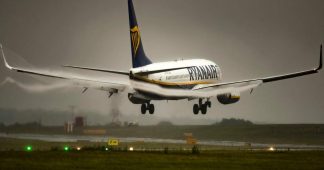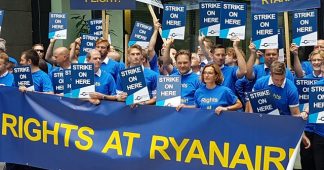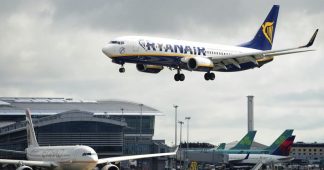By Gustav Kemper
28 September 2018
Cabin crew at Ryanair are on strike today in five European countries. The work stoppage began at 3 a.m. in Belgium, the Netherlands, Spain, and Portugal. After pilots in Belgium and the Netherlands committed to join the strike, the Cockpit union announced on Thursday that permanently employed pilots in Germany would also participate. This means the strike will be larger than any previous job action at the airline.
The German trade unions for cabin crew, Verdi and UFO, delayed their decision for as long as possible before confirming their participation in the strike. Both unions held separate talks with Ryanair this week. Verdi lead negotiator Mira Neumaier stated recently that the union wanted to consult members on the outcome of Tuesday’s talks before calling a strike. However, under pressure from the workforce, Verdi called on its members late Thursday to take part in the strike.
“There is still no satisfactory offer after four rounds of talks,” declared a press release. The result of the talks was summarised as follows, “Not enough money for workers, a long contractual period of four years, the unequal treatment of Ryanair employees and temporary workers, as well as Ryanair’s rejection of workers’ representation.”
Ryanair’s most recent offer contained just three pay increases of between €40 and €60 over four years, which would barely keep pace with inflation.
The “totally insecure working relations,” including temporary work, trial periods, fixed-term contracts, Irish labour law, were no longer acceptable, said the union.
UFO held its own talks with Ryanair on Thursday afternoon and stated that only after their failure could they legally call a strike.
The undignified working conditions and extreme levels of exploitation at Ryanair, which helped the airline become Europe’s largest budget airline, are infamous. The airline’s business model is based on its poorly paid and highly-exploited workforce. Whoever is hired by Ryanair faces the prospect of contract work, de facto self-employment, and precarious working relations.
During the last strike on September 12, a group of striking workers told the WSWS about their terrible working conditions, which had driven them to take strike action: “We work in two shifts, early and late. The early shift begins at 5:20 a.m. The late shift begins at 11 a.m. and can last until midnight,” they explained. However, they are only paid for part of this 12-hour period, i.e. for flying time. “Flying time begins when the plane leaves the gate. That means all of the flight preparations and clearing up is unpaid.” This means that of the 12 hours, only six or eight are compensated.
The monthly gross income for flight attendants at Ryanair is between €800 and €1,200, well below the pay at other budget airlines. The majority of cabin crew is employed by Ryanair’s labour contractors, Crewlink and Workforce, and have fixed-term contracts. These labour contractors have written a ban on giving press interviews into workers’ contracts to prevent the terrible working conditions from becoming public knowledge. This is also designed to block a common struggle by the workforce against the company. However, working conditions are so bad that strikers are more than willing to report them.
Asked what changes they would like to see in working conditions apart from pay, the group of Ryanair strikers answered spontaneously, “Sick pay is not in Ryanair’s vocabulary. If we’re sick, we receive no pay. The number of annual paid holidays is also very low, between 15 and 20 days, and one of these can be withdrawn over Christmas.”
The workers have been subject to massive intimidation by Ryanair. The company has threatened to shift striking employees to other European countries and shut down all German locations. Ryanair CEO Michael O’Leary declared that the company would make no concessions on wages. At the company’s general meeting last week, he announced that he is ready to extend his contract, which runs out in the autumn of 2019.
The airline is attempting to keep workers divided by only conducting talks with one union at a time. The European trade unions have accepted separate talks. A meeting had already taken place in Rome in early September, Neumaier told the WSWS, but there is another timetable. She was unable to explain what this meant.
The workers are not only fighting the company, but also the trade unions. These organisations do not represent the interests of employees but are trying to negotiate deals with Ryanair at the national level while competing among themselves for the greatest influence at the airline. In Italy, the Anpac trade union signed a contract with Ryanair on August 28 for the 300 pilots it represents. More than 500 pilots are employed by Ryanair in Italy. This first collective agreement at Ryanair in Europe, which was signed by airline workers, also applies to cabin crew, according to Anpac. The contract does not come close to addressing the demands and needs of airline workers. In many ways, it is worse than the status quo, since it bans strikes and does not allow for the free election of union representatives. The parties committed not to participate in strike action. Pilots and cabin crew are also reporting that they must still pay for their own uniforms and no longer get free food and drink on board.
Concrete figures on Ryanair’s concessions on wages and social benefits were not published, but many workers have reported they were inadequate. Two other Italian unions (Filt Cgil and Uiltrasporti) described the contract as totally unacceptable and plan to continue strikes.
The contract requires Ryanair to participate in a health insurance scheme and offer sick pay of €76 per day. It permits a maximum of 10 months of parental leave per couple, although this applies only to permanently employed workers. There is nothing in the contract to prevent employment by Ryanair’s job agencies CrewLink and Workforce. This means that Ryanair can simply avoid the additional costs contained in the contract by hiring more pilots and cabin crew through these firms.
The strikes at Ryanair have now lasted over several months. But the one-day strikes have yet to produce any result and threaten to wear down the workers’ militancy. The unions’ tactics confirm what the WSWS wrote on 9 August, “The only way to combat this global offensive of the employers is through a global counter-offensive by the workers. Ryanair pilots, cabin crew, and ground crew must free themselves from the grip of the unions and take the conduct of the struggle into their own hands. They must organise rank-and-file committees independently of the unions to unite the struggle of all Ryanair workers across national borders and at the same time call for support from airline, transportation, and delivery workers around the world.”










